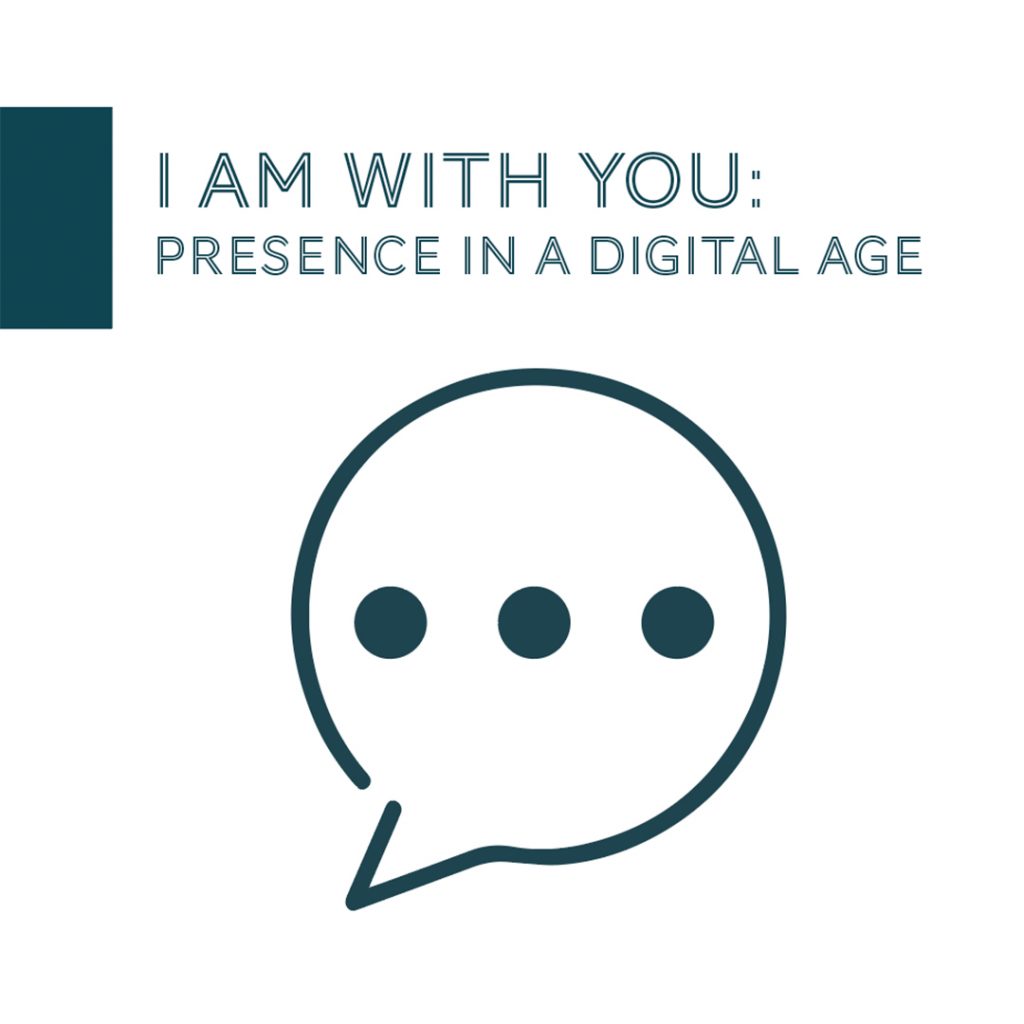I am with you: Presence in a digital age
 by Michael Schutz
by Michael Schutz
When I write the words “video call”, what’s the first thing that comes to your mind? The joy of hearing and seeing people who are far away? Dread at having to remind someone that he’s muted on yet another business call that could have been an email? Being exhausted from trying to stay engaged in the middle of a screen full of distractions?
Over the past couple of years, the whole idea of presence has been thrown onto the world stage. Questions about the idea certainly existed before March 2020, but now it seems like everyone is grappling with what it means to be present. Office staff are wrestling with how work can (and can’t) be done remotely. Families and friends who can’t travel to be in-person rely on digital means like video calls to stay connected. Even Christian congregations have struggled to figure out what it means to be present with one another.
This isn’t just a COVID issue, though. As with so many challenges, this issue existed well before the pandemic; it’s simply been amplified by it. Telecommuting, video calls with grandparents, and online meetings with Lutheran Church–Canada groups were all happening before the spring of 2020. But they were seen then as supplements to in-person interaction; hardly ever were they thought of as replacements. Now, though, the value of in-person interaction is openly (and hotly!) debated.
 This is something the Church needs to grapple with. We can’t simply ignore it, brush it off, or be glib about it. If we are to be like the men of Issachar, who understood the times to know what Israel should do (1 Chronicles 12:32), we need to understand what the people in our culture and congregations are wrestling with—the questions that they’re asking and the challenges they’re facing. And one such question is, what does it mean to be “present” in a digital age?
This is something the Church needs to grapple with. We can’t simply ignore it, brush it off, or be glib about it. If we are to be like the men of Issachar, who understood the times to know what Israel should do (1 Chronicles 12:32), we need to understand what the people in our culture and congregations are wrestling with—the questions that they’re asking and the challenges they’re facing. And one such question is, what does it mean to be “present” in a digital age?
The explosion of technology over the last half-century has pushed this question into everyday life. There are essentially two ways that people have always communicated: directly in-person or through a mediator over distance and time. The number and types of these mediators have grown steadily over time, and in the last thirty years they’ve multiplied. In ancient times, there were letters and messengers. They enabled messages to spread far beyond a person’s physical voice. But those messages were delayed in time. The telephone added real-time audio over great distances, and voicemail added delayed audio. Digital technology and especially the internet have multiplied both real-time and delayed options for messages. Anyone with internet access can now send near-instantaneous messages to one other person or millions, down the street or across the world.
It is this “digitally-mediated” communication that now occupies the hearts and minds of billions of people in our world. Because it can be close to replicating in-person communication—think of a video call where you can see and hear others in real-time—our culture is asking the question: is that good enough?
The theological question of presence in our digital age is a significant one. Especially at this time of year it’s worth pausing to consider how Christians engage with the question. It’s important because so much of our comfort comes from the promises of Jesus in places like Matthew 28:20: “Behold, I am with you always, to the end of the age.” As we move towards Christmas and again celebrate the incarnate (literally, “in the flesh”) Word of God, it’s helpful and even necessary to consider: what does it mean in this digital age for God to be present with us and for us to be present with one another?
The Scriptures are full of God’s presence. And I don’t just mean they’re full of accounts of Yahweh’s presence, like when He was walking in the garden of Eden; standing with Hanaiah, Mishael, and Azariah in Nebuchadnezzar’s fiery furnace; or when the Word became flesh and dwelt among us. Even when we hear God’s revealed Word, He is present with us, speaking to us. One of our old theologians, Francis Pieper, put it this way: “He, however, who considers Scripture to be the very Word of God… does not think of a ‘remote action as to space and time,’ but as he reads his Bible, he is aware that God Himself is speaking to him, that through the Word of the Law He is convincing him of his sin and just condemnation, and that through the Word of the Gospel He is assuring him of the forgiveness of his sins and salvation and inviting him to believe this Word of the Gospel.”
 God doesn’t just tweet at us with “thoughts and prayers,” as if He is far from us and wishing us the best while we fend for ourselves. God has never acted like that and never will. For our good as sinful people, though, God has mediated His presence in history. Exodus 33 is a fascinating example: we read that Yahweh spoke with Moses “face to face, as a man speaks with a friend.” And yet, just a few verses later, when Moses asked to see Yahweh’s glory, He replied “you cannot see My face, for man shall not see Me and live.” Yahweh’s mediated presence appears throughout the Old Testament: speaking to Moses in the bush that did not burn up, leading the people out of Egypt in the pillar of cloud and of fire, filling the tabernacle with the cloud of glory, meeting with Israel in the Most Holy place in the temple, and so much more.
God doesn’t just tweet at us with “thoughts and prayers,” as if He is far from us and wishing us the best while we fend for ourselves. God has never acted like that and never will. For our good as sinful people, though, God has mediated His presence in history. Exodus 33 is a fascinating example: we read that Yahweh spoke with Moses “face to face, as a man speaks with a friend.” And yet, just a few verses later, when Moses asked to see Yahweh’s glory, He replied “you cannot see My face, for man shall not see Me and live.” Yahweh’s mediated presence appears throughout the Old Testament: speaking to Moses in the bush that did not burn up, leading the people out of Egypt in the pillar of cloud and of fire, filling the tabernacle with the cloud of glory, meeting with Israel in the Most Holy place in the temple, and so much more.
Then, when the time had fully come, Yahweh tabernacled with His people in the Word made flesh. In Christ, God was literally, physically, in-person present with people! In Immanuel—“God With Us”—people could see the face of God and live! So, Simeon boldly said as he held the infant Christ, “My eyes have seen Your salvation that You have prepared in the presence of all peoples” (Luke 2:30-31).
Following His ascension, Jesus is still with us. The Spirit of Jesus Christ has been poured out upon His Church. “The Spirit of Him who raised Jesus from the dead dwells in you,” Paul writes to the Church in Rome (8:11). Yahweh gives His grace through means that assure us that He is with us today. The Gospel isn’t just a word about Yahweh; it is His very power unto salvation. In Baptism we receive “the washing of regeneration and renewal of the Holy Spirit” (Titus 3:5). In the Lord’s Supper the very body and blood of Christ are truly present in, with, and under the bread and wine in a mysterious—yet completely real!— way. Christ is still present with His Church—with us!—and we are united with Him as His Church.
Therefore, far in advance of the advent of digital technology, the Apostle Paul could write to the Church at Colosse and Corinth that, though he was absent in body, he was with them—he was present—in spirit. This wasn’t just “thoughts and prayers,” a phrase that has become an empty cliché for so many in our culture. It was an expression of the deep bond we share as the Church.
So, what are we to make of all this today? In this digital age, can we Christians make use of technology—both digital and analog—to be “present” with one another? Can the Church use video and phone calls, letters, text messages, emails, and social media to stay connected with one another? Can we rightly consider that we are present with people through these things? Further, can the “mediated” Word of God go out among us and from us and still accomplish the purposes for which He has sent it? Definitely!
But these things can never replace in-person (“immediate”) connection, especially around God’s Word and Sacraments. God Himself designed the Church to gather in-person to receive His gifts and respond with the deepest activity of the heart and faith. The primary New Testament word for church—ekklesia—means “assembly”! There is much debate over the validity of defining “gathering” to include “mediated” methods, and we don’t have room to enter that whole discussion here. It must suffice to say that while we celebrate the advance of digitally-mediated communication that helps the Gospel to spread, we continue to hold up God’s design as good, right, and life-giving for the whole Church until that day when we will no longer see as in a mirror dimly but behold God face to face. We long for the fulfillment of the promise revealed to John: “Behold, the dwelling place of God is with man. He will dwell with them, and they will be His people, and God Himself will be with them as their God.” Amen. Come, Lord Jesus.
———————
Rev. Michael Schutz serves as pastor at Concordia Lutheran Church & School in Penticton, B.C.




